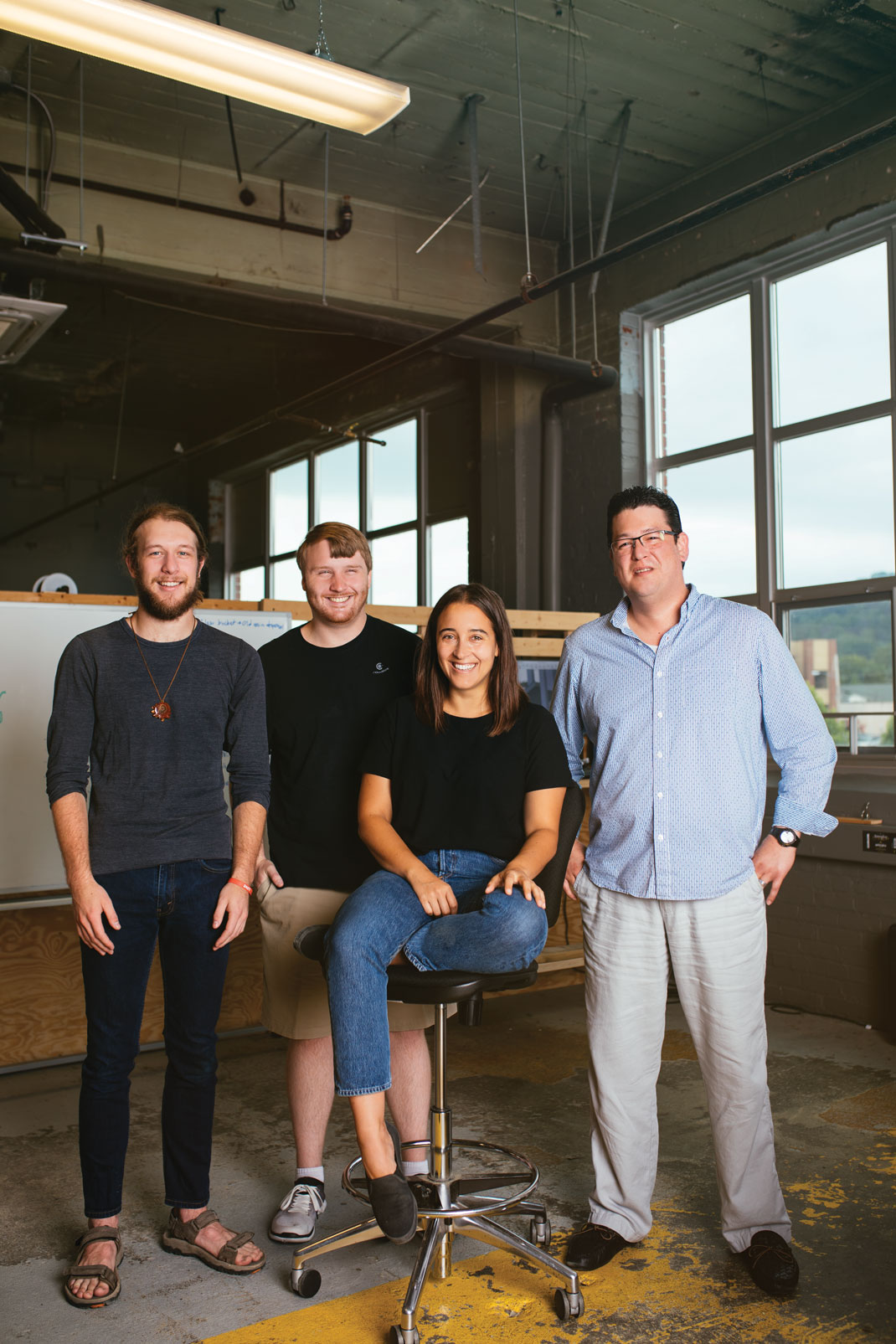Everything that I need to grow my business is right here in the INCubator.
More Info
Even more innovation…Oct. 16-20 is Chattanooga’s Startup Week. Startup Week celebrates Chattanooga’s entrepreneurial spirit with a week of community-led events that highlight our growing startup scene. Participants include startup founders, thought leaders, community supporters, investors and local professionals. As part of Startup Week, the Chattanooga Chamber of Commerce hosts its annual Spirit of Innovation event Oct. 20 to recognize Chattanooga’s most innovative companies. The Spirit of Innovation Award is a community-based honor for a company that has implemented innovative practices or products that have produced tangible results and reflect on the Chattanooga region as a place that nurtures the innovative spirit.› Find more information and nominate a business at chattanoogachamber.com.
Stepping from Cherokee Boulevard on Chattanooga's Northshore into the art-deco styled Hamilton County Business Development Center, you trade the bustle of a busy street for a different kind of buzz: the energetic hum of about 50 startups. The INCubator, located inside the Hamilton County Business Development Center (BDC), has graduated 556 businesses into the local economy. Inside its walls today, companies are innovating in hot industries ranging from 3-D printing to health care.
Collider
Collider wants to simplify the process of making things. Founder Graham Bredemeyer became fascinated with 3-D printing as a teen, and went on to glean extensive experience in that space, including a stint at Shapeways, the world's leading 3-D printing marketplace and community.
"I saw that manufacturers were facing a problem when it came to mold-making and tooling that 3-D printing happened to be really good at solving," Bredemeyer says. "Traditional manufacturing can make parts at a good price with great surface quality, but every time you want to change the shape of a part – or make a new one – you're looking at thousands of dollars and weeks of lead time. So it became a question of how to take this space that I know a lot about and address a problem."
Bredemeyer solved this with a proprietary Programmable Tooling process and a revolutionary 3-D printing machine called Orchid. Collider's Programmable Tooling process slashes the amount of both time and money required for traditional tooling, a process used to mass produce plastic parts like shoe soles, prosthetic liners and car parts. Collider's hybrid manufacturing method produces both end-use parts and tooling molds using traditional manufacturing materials. Orchid prints a thin shell, which is then filled with resin and eventually dissolved, leaving the desired final product.
"We really focus on the materials we use to print the molds," Bredemeyer says. "Everything that gets injected into those molds - with the exception of metal - is off-the-shelf material, which is less expensive but still industry-tested."
Orchid produces metal, silicone, rubber and plastic production quality parts on demand. It's one of the first 3-D printers with the capability to make metal parts. The Orchid's technology landed Collider a spot at TechCrunch's Startup Battlefield, a pitch competition for 20 innovative startups from around the country. Collider placed second, winning a case of PBR, as well as a ton of national publicity sure to help with venture capital. Orchid is still in preproduction, but Collider plans to ship customer-ready machines in early 2018. "Our vision is to be a part of making every physical product," says Cacky Calderon, Collider's Chief Operating Officer. "Whether it's being a part of the manufacturing or prototyping process, we want Orchid to be part of making anything you touch or wear."
' For more on Collider, visit collidertech.com.
CPR LifeWrap
Felicia Jackson, founder of CPR LifeWrap, says her business idea came from a nearly tragic event when her toddler son experienced a choking incident in the backseat of her car, resulting in difficulty breathing and nearly slipping into unconsciousness. Despite having received CPR training, Jackson panicked. She froze, and couldn't recall how to perform CPR. Jackson's husband acted quickly, and their son survived. The event sparked Jackson's determination to help others avoid similar situations. The CPR LifeWrap serves as a disposable plastic guide for CPR administration. The see-through template can be placed over the afflicted person's chest and face with a simple diagram for performing the procedure. LifeWrap is in production and available for both individual and bulk purchase, and Jackson says it's time to get the product to a wider audience.
"At the end of the day, we are about educating people on the importance of being CPR ready," Jackson says. "With the CPR LifeWrap, everyone has the opportunity to be prepared in case of an emergency."
With a bustling health care industry in our region - health care organizations employ nearly 19,000 full- and part-time employees in our area - Jackson is partnering with several major local healthcare organizations, including Siskin Children's Institute, as well as the Hamilton County Department of Education. "We are pleased to be a nonprofit partner with Felicia on the CPR LifeWrap product," says Linda McReynolds, Director of Development at Siskin Children's Institute. "We are working with her to explore funding and to identify partners within the community to provide this lifesaving tool. We see the value of the CPR LifeWrap and realize the impact that this tool could have on the health and safety of this community."
CPR LifeWrap could save countless lives by making CPR a less intimidating process for those with and without training.
' Learn more at cprlifewrap.com.
About the INCubator
Chattanooga teems with startups and growing businesses. In recent years, the boom of startup culture here has been especially far-reaching.
"I'm homegrown – I've been in this area all my life," Jackson says. "I've dabbled in other cities, but I've always come back. I think that Chattanooga is setting a precedent – other cities are looking to us to see how to better support entrepreneurs."
From CO.LAB, a nonprofit hosting startup accelerator programs, to Launch Chattanooga, The Edney Innovation Center and the Hamilton County INCubator, our community is a hotbed of startup activity. But that's nothing new. Our INCubator has fostered young companies for more than 30 years.
Its building has a storied past. Designed and built as a furniture manufacturing warehouse in the 1920s, it's been a home to companies like 3M, who turned the building over to Hamilton County in 1984, when work began to convert the space into a business incubator. In 1998, the Chattanooga Chamber of Commerce began operating the BDC for Hamilton County.
In addition to offering space and support for its businesses, the INCubator draws relevant programming like its June session with the National Science Foundation, which awards nearly $190 million annually to help small businesses transform technology into products and services with commercial and societal impact.
Chattanooga's INCubator is the third largest in the U.S. and boasts a roster of companies as impressive as Collider and CPR Lifewrap, companies like current client Variable, Inc. and INCubator graduate RMJ Tactical. Variable takes the stress out of interior design with its NODE, a digital tool and app. Node uses color matching technology to allow users to scan and identify colors and then find matching palettes and products via the app. RMJ Tactical's products, while admittedly less delicate, are equally remarkable. The company manufactures a variety of elite military tactical gear, from hatchets to knives. Perhaps the most prominent tool in their arsenal is their tomahawk, which was featured on the History Channel's "Modern Marvels: Axes."

